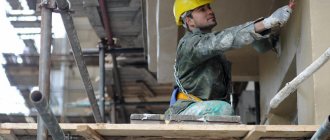Most compatriots in modern life live in apartment buildings, where the common area is the entrances and the building itself.
Dear readers! The article talks about typical ways to resolve legal issues, but each case is individual. If you want to find out how to solve your particular problem , contact a consultant:
8 (800) 700 95 53
APPLICATIONS AND CALLS ARE ACCEPTED 24/7 and 7 days a week.
It's fast and FREE !
In this case, service organizations are not authorized to carry out reconstructive or major repairs in residential buildings at their own expense.
All this is provided through citizens’ contributions for major repairs, which in turn are often included in utility bills.
Necessary aspects
In accordance with current legislation, every citizen who lives in an apartment building is obliged to pay utility bills on time.
In addition, if this is not provided by the management organization, fees for major repairs of an apartment building are paid separately.
This is an integral part of the life of citizens who live in apartment buildings. However, in some cases, citizens do not have enough available funds for the mandatory payment for major repairs of the building; in this case, the statute of limitations begins to count.
The time period when the management company has the right to go to court to force the collection of a fee for major repairs of residential space that is in general use.
Main concepts
Before considering what the statute of limitations for major repairs is, you should consider a number of concepts that are closely related to this point:
| Major renovation | Providing the building of an apartment building, namely individual common areas, with complete restructuring at the expense of a special fund |
| Contributions for major repairs | Mandatory amounts of funds collected by the management organization from residents of an apartment building for the purpose of subsequent repair work |
| Own | A certain form of property that is in the temporary or permanent possession of a citizen, which is confirmed by the presence of documents |
| Management Company | An organization that provides maintenance to an apartment building, ensures its maintenance before the state, and also, if necessary, carries out repair work |
| Limitation of actions | The time period when a civil procedural case can be opened against a citizen for the purpose of forced collection of debt on contributions for major repairs |
| Courts | Government apparatus responsible to the population for resolving controversial situations, and also authorized to call for accountability for offenses committed |
Taking into account these concepts, it will be much easier to consider the statute of limitations for major repairs of buildings, as well as the mandatory contribution of funds for these actions.
Basic conditions for going to court
It is worth noting that in this case, both the management company against the defaulter, and the residents of the apartment building or representatives of another situation can apply to the court.
Let's consider the main conditions for going to court:
- the citizen does not pay mandatory contributions for major repairs;
- the management organization does not fulfill its immediate responsibilities;
- the management organization ignores the demands of residents;
- the management company does not carry out scheduled repairs;
- The management organization does not carry out major repairs for a long time.
In this case, we are primarily talking about companies that, having collected the funds necessary for repairs, do not fulfill their obligations, which is why citizens have controversial and conflict situations.
Legal basis
Regulation of the issue of establishing a statute of limitations for housing disputes regarding the inaction of the management company or non-payment of citizens' funds for major repairs is based on the following regulatory legal acts:
- Resolution of the Plenum of the Supreme Court of the Russian Federation dated December 11, 2012 No. 29 “On the application of civil procedural legislation by courts”;
- regulatory legal acts regulating the activities of courts in Russia;
- Housing Code of the Russian Federation, article No. 169;
- Civil Procedure Code of the Russian Federation, Article No. 196.
Based on these documents, a statute of limitations is established when the case can be brought to trial against a citizen or management organization.
Those who are not beneficiaries, but still do not have to pay for major repairs
1) The law imposes the obligation to pay contributions for major repairs only on the owners of residential premises. Therefore, contributions cannot be charged to someone who is simply registered in an apartment without being its owner, as well as to residents of non-privatized apartments.
Please note that as soon as ownership of the property is terminated (for example, the apartment is sold or donated), the responsibility to pay for major repairs passes to the new owner.
This also applies to debts: if the previous owner did not pay for major repairs, then the new owner will have to pay off the debt. This rule applies only to contributions for major repairs (Part 3 of Article 158 of the Housing Code of the Russian Federation).
Therefore, before buying an apartment, be sure to check whether the seller has any debts on these fees - otherwise you will have to pay them.
2) The Housing Code of the Russian Federation exempts owners of apartments in a building that is recognized as unsafe or located on a land plot seized for state needs from paying for major repairs. At the same time, the owners are refunded the contributions for major repairs that they paid before.
3) Regions are allowed to exempt small houses with less than 5 apartments from paying for major repairs. All contributions that owners of apartments in such buildings previously paid are subject to refund.
4) For those who purchased an apartment in a new building, there is a certain period of exemption from contributions for major repairs.
The fact is that new buildings are included in the overhaul program only after the expiration of the period determined by the regional authorities (the Housing Code sets only its upper limit - 5 years).
For example, in the Nizhny Novgorod region, the period of exemption from fees for major repairs of new buildings is the same 5 years from the date of inclusion of the house in the regional capital repair program, and in the Sverdlovsk region - 3 years.
How to calculate the statute of limitations on contributions for major repairs
Like any other case in civil procedural disputes, the limitation period for contributions for capital repairs has certain rules of reference.
In this case, it is necessary to consider how to correctly calculate the statute of limitations for contributions for major repairs of a building or other property:
- It is worth recalling that the maximum limitation period according to the Civil Code of the Russian Federation is ten years from the date of discovery of the offense.
- The statute of limitations for contributions for capital repairs is three years from the date of missing the next payment of funds.
- The statute of limitations can be fully restored by the court if there are mitigating circumstances.
- The limitation period for contributions for capital repairs may be suspended or renewed by a court decision, if there is a corresponding application.
- The limitation period is subject to recalculation if the citizen who missed payments makes the payment again.
Thus, for major repairs and mandatory contributions, a time period of three years is established - this is the period when a claim may be brought to court for the forced collection of contributions.
Features of setting restrictions
When counting the limitation period for contributions for major repairs, as a rule, you may encounter some peculiarities, namely:
- the limitation period begins to run from the moment the offense is discovered;
- the statute of limitations in this case starts from the moment when the citizen was supposed to make the next contribution;
- the statute of limitations may be suspended, renewed or fully restored by the court, if appropriate circumstances exist;
- the limitation period is interrupted at the moment when the citizen deposits a certain amount into the account;
- the limitation period may be interrupted if the parties have reached a mutually beneficial solution to the situation.
As a rule, these are the main features that can be encountered when determining the conditions for limiting the limitation of actions.
Debts in apartment buildings
Each apartment building is on the balance sheet of a specific management company, which provides the necessary services.
In turn, citizens living in this house must regularly pay not only utilities, but also pay fees for major repairs.
Otherwise, the management company will not perform this action, which is mandatory for it. Because of this, three years are allotted to bring the defaulter of contributions to justice through the courts.
Household appliances
Household appliances, as a rule, are purchased under a corresponding purchase and sale agreement, where there may be a separate service point.
If the client does not want to use this service, then he can refuse to pay the fees, but he will not have the right to demand payment for the fees, since in this case the contract is terminated unilaterally. Here, the limitation period is set at one year, since the transaction is considered voidable.
Calculation of penalties for major repairs
Basically, failure to pay for major repairs risks having to pay much more than the outstanding debts. In cases where the owner does not pay cap. repairs for more than two months, the housing organization goes to court to collect the amount of debt and penalties. The amount of the fine is determined by a court decision in accordance with the rules for calculating this monetary sanction.
This rule is provided for in Article 155 of the Housing Code and is presented as a method of influencing persistent defaulters. Penalties have the nature of a sanction, rather than the nature that is enshrined in civil law.
Overhaul - what is it?
In the Civil Code, major repairs refer to a whole range of works. Their main goal is to restore structures and various elements, and replace utility networks.
If necessary, structures with a load-bearing function are also repaired. Major repairs are carried out to eliminate the deterioration of buildings. Then the object is brought into a form suitable for continued operation. Replacement of equipment with new samples is also included in the work.
We are talking about elevator shafts and meters. Under such circumstances, repairs require more costs compared to cosmetic work.
How will they be punished for failure to pay contributions to the capital repair fund?
The work will still be done as planned, regardless of whether you pay or do not pay the overhaul fees.
Accumulated debts will still be collected because local authorities have the right to recover arrears from defaulters. Penalties and fines are also paid.
For each month of late contributions, the fund will charge a penalty on the amount of debt in the amount of 0.5 to 5% of the payment. First, the defaulter is notified of the possible filing of a lawsuit. After six months, the issue can be referred to the judicial authorities.
If in court the defaulter does not find compelling reasons to justify himself, then by a court decision the debt, penalties, and all legal expenses will be borne by him.
Is it legal to fine for non-payment of debt for major repairs?
Penalties for late payments for major repairs are expressly provided for by law.
We recommend reading: What is the difference between revenue and income?
The amount of penalties is equal to 1/300 of the refinancing rate of the Bank of the Russian Federation, valid on the day of payment, for each day of late payment. Thus, according to Article 155 of the Housing Code of the Russian Federation, persons who have untimely and (or) not fully paid for housing and utilities are required to pay the creditor a penalty in the amount of one three hundredth of the refinancing rate of the Central Bank of the Russian Federation, valid on the day of actual payment, from the unpaid term of the amount for each day of delay starting from the thirty-first day following the day of the established payment due date until the day of actual payment made within ninety calendar days from the date of the established payment due date, or until the expiration of ninety calendar days after the date of the established payment due date , if payment is not made within ninety days. Do you want to know more? Subscribe to my channel, likes, reposts on social networks and comments are welcome. A lot of interesting and useful information on the Group’s website on social networks VK OK Facebook Sincerely your author







